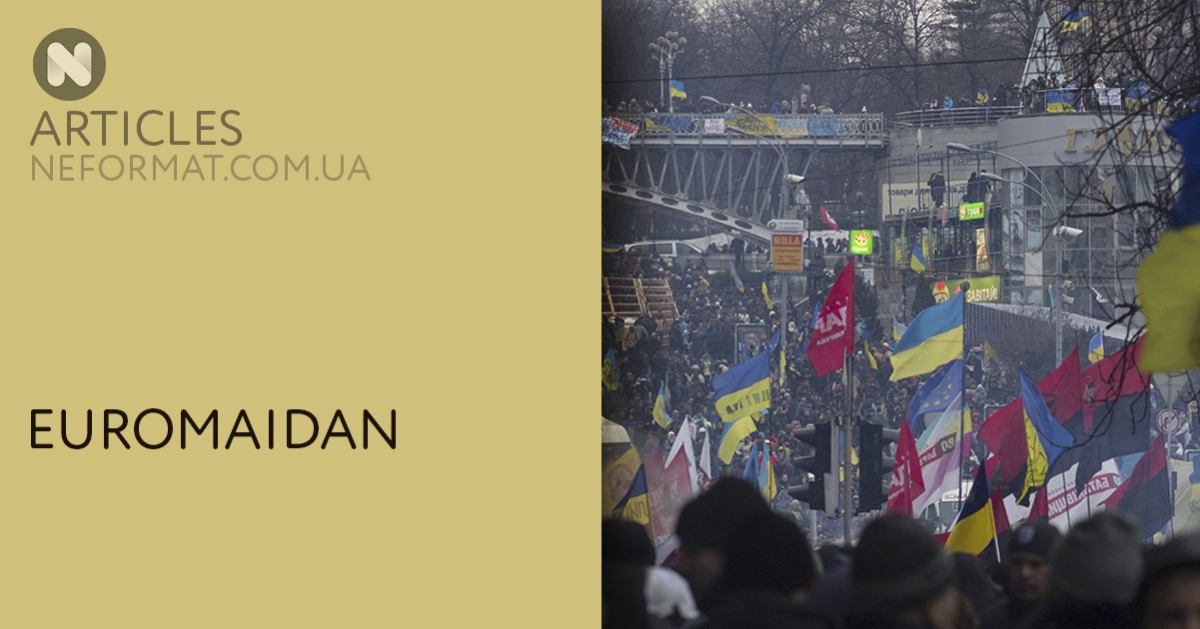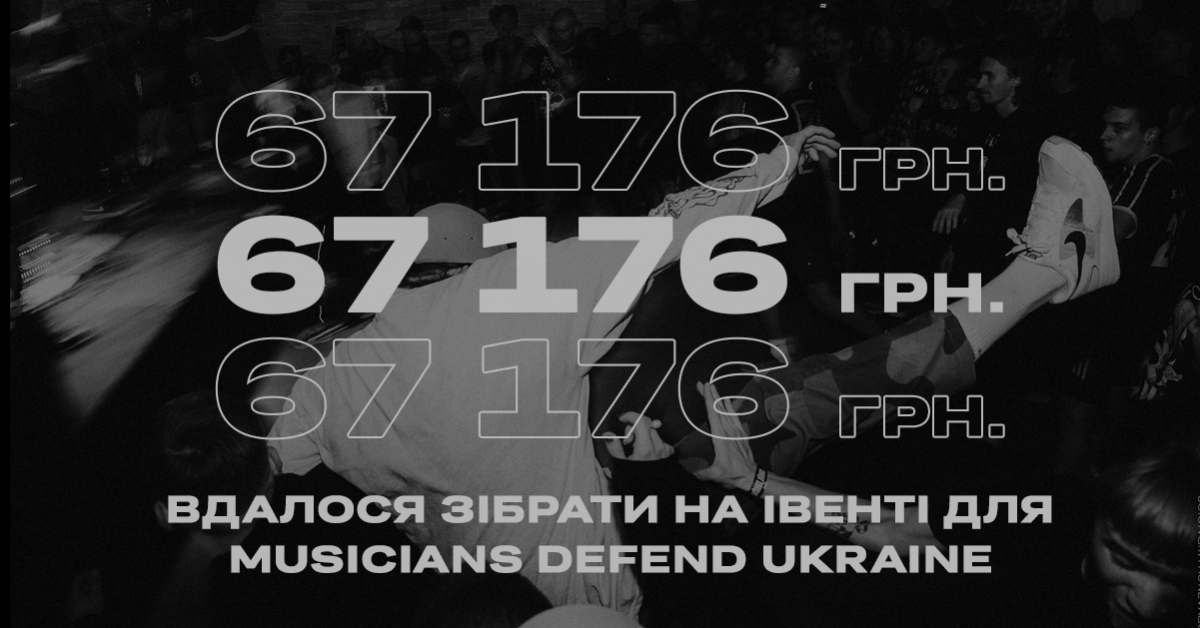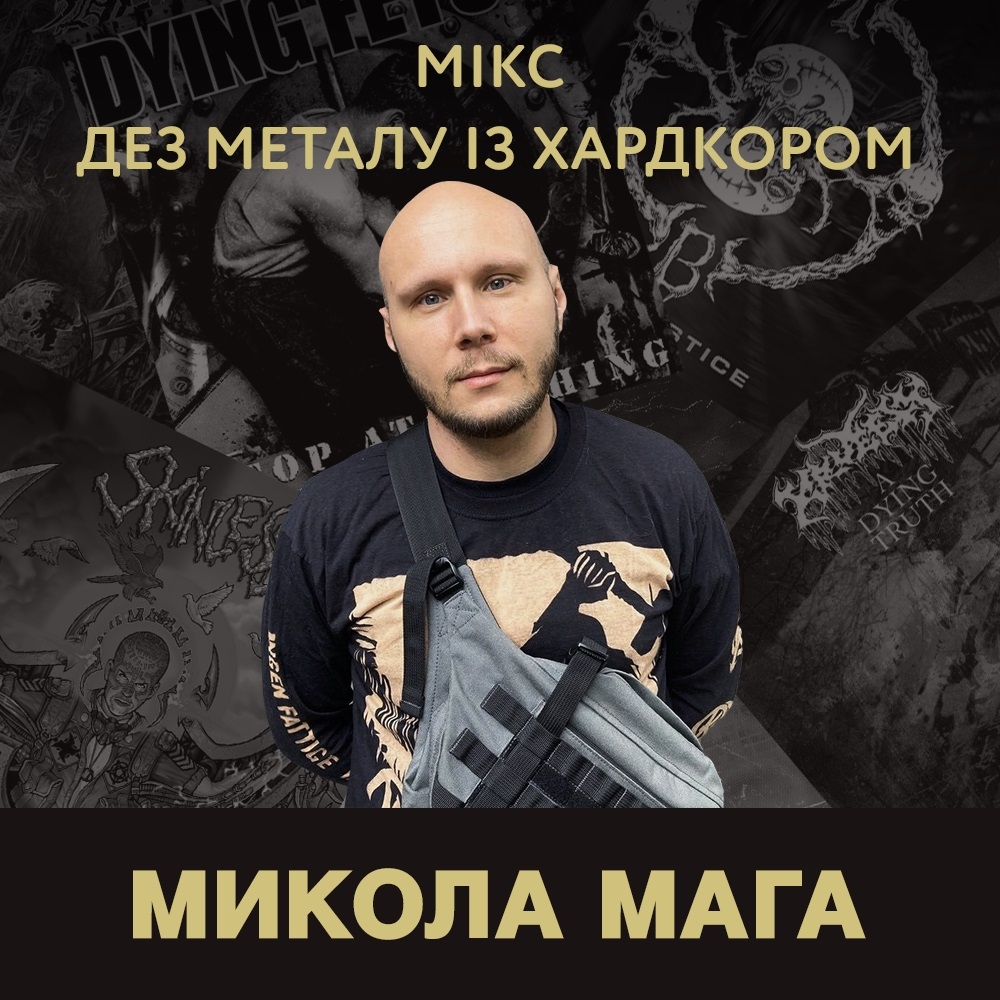Euromaidan in the Eyes of Musicians: 7 years from now

Lots of people came to the protests, disagreed with then-authorities, opposed the corruption, law enforcement arbitrariness and the abolition of the Ukraine-European Union Association Agreement. Remembering how it all happened and how it influenced the musicians, many of whom were at the protests, we asked them three questions: what are your memories of Maidan? How did it influence the development of Ukraine and Ukrainian music in general? How did it affect you personally and/or your work?

When Maidan began and the war broke out, people finally started understanding where they lived. We began to self-identify and understand that we were living in Ukraine, not in Russia, that we have own culture and language. People started to defend what they had, and switch to the Ukrainian. When walking near the house or school, I see Ukrainian-speaking children and families. There are dozens of them, which is very nice. It is sad, of course, that such understanding was provoked by the war, that it came with thousands of deaths, a complete fuck-up and a total failure in all fields. Only then people begin to realize something. But still, it probably had to happen to people so they could understand where they are, where they live, how they communicate and what they will leave behind themselves for the future generations. Even my inner circle of friends, who used to mock now and then, start to switch to Ukrainian now. In my opinion, language is the most powerful weapon you can arm yourself with. In any case, we will win this war, but we must develop and defend our linguistic and cultural interests. I think this is the most important task. As for Maidan, it has been said so much about it that I ain’t hoping to add anything new. As a phenomenon, of course, it's cool — everything that happened.
How did all these events affect our work? During Maidan, we found Taras, our vocalist, which is why we are very happy. Our ex-vocalist Rostyk left the band for his own reasons, he could no longer play with us. We knew Taras before, but due to the Maidan Revolution we began communicating more closely. We invited him to join our band. I remember he didn't really believe that anything could come out of it. But still he gave it a try.
Ponomariovv — Сонце зійде (2020)

Maidan didn`t last long for me due to poor health. In addition, speaking of moral terms, I was not quite ready for such a challenge at that time, although I am infinitely grateful to myself for the couple of those December days of 2013 spent in Kyiv. I didn`t have friends in Kyiv, so I was staying in the Transcarpathian tent overnight, by the main Post. I remember it well, waking up in the terrible cold to some of the songs by Okean Elzy, eating simple bologna sandwiches, seeing blue and yellow ribbons everywhere, people all around... A lot of very different people. At that time, no one was dead or went missing yet, but the aggression on the part of security service agents was growing, infiltrating all around. At the same time, people on Maidan seemed to be ready for that. And it felt like it was a separate country within a country, because everything was so well-organized. I spent most of the day just wandering between the tents and looking around. I may not have done much, but this experience was enough for me to deeply feel those events and those people. That's the reason why I haven't watched any documentaries yet, because I'll probably start crying even before the movie starts.
As for the music, I think that in many areas Euromaidan has become an impulse for paying more attention to the actual Ukrainian product, Ukrainian identity. Culture is no exception here. There was a number of political steps taken to support the Ukrainian language, quotas on the radio as well. And although now, judging upon the feedback I see, it seems to hardly work out, as if the quality of music has not improved, I can`t totally agree with that. Though I also foresaw that quotas would have had a little effect on the quality of content, but I think it is of importance to increase the amount of Ukrainian language around us in everything. Bad songs in Ukrainian are still better than same crap but in Russian. Another problem is that the radio does not work with the so-called indie segment, where a lot of interesting and good-quality material is, but I don`t feel competent enough to draw black-and-white conclusions about the causes of this phenomenon.
What I`m trying to say is the fact that if there was not Euromaidan, this surge of attention and support for Ukrainian-speaking culture certainly would not take place, and in my opinion, it is extremely important, despite the unfortunate wind-up that has been noticed in this policy recently.
Personally, I didn't have a band during the Euromaidan. Nevertheless, it was the time I started working as a journalist, and I think those events had a great impact on my professional making, which is ultimately reflected in one way or another in my work on Neformat. There was the ideological influence in a sense. Since then, I have become much more interested in Ukrainian politics, its impact on our country and on our daily lives, and it is reflected in the lyrics I write for Gnit.
Cios — Улицы в огне (2014)

I attended local events in Uzhhorod quite actively, I was there during the attempt of the regional council assault. Me and my fellow soccer fans rushed there bursting with righteous anger. In my hometown I felt calm and excited, to some extent. But it was frightening to go to Kyiv, because the fights with the Berkut officers have already started and there were first people killed. Still, I went for a few days, I couldn`t act otherwise. I met my friends from the hardcore-punk scene, helped with building the barricades and smoking the internal military forces out of the Ukrainian House. It was very cold, but I felt excited. The bloody finale of the revolution was still a long way off.
In the first post-revolutionary years, many young Ukrainian musicians thought they would break into the industry, change the rules of the game, push away the oldies. None of this happened. The dun is still in the mire. There`s a handful of those who broke through with the general picture remaining unchanged: radio swarmed with schlock, young people are still into Russian stuff, and underground exists separately.
After the revolution events and the still ongoing war, my bandmates have only strengthened their anti-authoritarian and anti-imperialist position. Let's just say that the things we touch upon in our lyrics are not for show, they demonstrate our attitude. As for the band and its functioning, see the take on the underground above.
Обрій — Ad Civitas Solis (2020)

I arrived at Maidan by bus together with the other volunteers. On our first night we slept in a locked administrative building, I can't remember which one. We were sleeping right on the carpet. It was so darn cold and that terrible snoring all around, I could not sleep, so I went into the hallway to change the situation a bit. And there were two photographers showing off their cool photos to each other. Since then, I kinda have no particular liking for photographers.
And in the morning I was hungry. I saw queues standing cauldrons with food. I stood there and a fellow asked me:
— What regiment are you from?
— None, I answered.
— Then you get no food.
I didn't like it either.
Then there were rallies, all sorts of political animals, oppositionists with their ardent speeches, "glory to Ukraine, death to enemies!", "Who`s not jumping he`s a Moskal", slogans that made it clear they were people pleasers, aiming at getting support. I did not like it at all. I went to Hrushevsky street, where the direct confrontation was, it was fierce. I must confess, hearing a sound bomb exploding nearby is very scary. I threw stones at the far away standing pigs, and though it didn`t hit home, the process itself attracted me. It I felt like I was doing the right thing. Then a "truce" was declared. We built barricades out of snow-filled bags. Girls brought us tea with a lemon galore in it. There was so much lemon in it that it tasted disgustingly sour and didn`t have even a vague resemblance to tea. The non-stop shouting of "glory to Ukraine - death to the enemies" was so morally exhausting that even my head started aching. I didn't stay on the Maidan overnight anymore, I stayed at my childhood friend`s place, we watched the 90s action movies, and in the morning, I went to build barricades out of snow and tires again. In 5 days I went home to Lviv, because the situation seemed to stabilize. As it turned out, it was a lull before the storm.
Maidan was a great influence for Ukraine. We have hundreds of workies who could have lived happily and enjoy life, but they are killed for wanting that better life; we have Crimea lost, the war in the East with thousands of young boys killed, and hundreds more disabled; we have memes on the "legitimate president", Schengen visa-free travel, good roads in Lviv region, and on laws on decommunization and decentralization.
Did it influence the development of Ukrainian music? I can't say objectively, because I only follow the punk scene, and, in fact, the subject of the Maidan itself wasn`t very much approached in it. There have been less bands coming from Russia, there were years when they were not allowed to enter the country at all, which, in my opinion, had a negative impact. Music should have no geographical boundaries, and sharing experiences with bands from other countries is always important, because one gets bored with same old sooner or later.
I was more influenced by the events after the Maidan. In fact, the war in Donbass inspired me to write songs for Dogs Have no Hell — "For No Special Reason" ("Без особых причин") and "In the Firing Line" ("На линии огня"). The lyrics in the first one goes like this: "We are so alike, tell me, why? Why did someone make us enemies? Who made you believe these tricks? Are we the ones to blame?” ("Мы так ведь похожи, скажи же, зачем? Почему кто-то сделал нас врагами? Кто заставил поверить в этот подлый обман? Неужели виноваты мы сами?") With these words I meant to say that there`s war between people who have been bullied against each other, but they didn`t feel this hatred until the wheels of a propaganda machine started turning on both sides. And the Maidan played a significant role in it, by the way. As for us, Ukrainians in reality, we are neither worse nor better than the Russians or anyone else. Thus, when hearing "glory to the nation", I keep silence, not because I do not want my enemies dead, but because they are trying to impose those enemies on me.
Kotra vs Edward Sol — Sokyra (2017)

I remember coming to the Winter Mass, but the events have already gained such momentum that we dropped our guitars, canceled the performance, and went to the barricades. I`ve never seen such a spontaneously created "micro-empire" before. Seeing people with completely different views uniting against a common enemy was nice.
There was a certain outburst after the revolution. People became more interested in "what's going on with us". But the outburst has faded today. I still see comments like "wow, guys, I've been listening to your music for a few years and didn`t know until now that you're from Ukraine." I can`t say how it affected Ukraine itself, because the question is too complex. In short, it is definitely positive. People start withdrawing from this Soviet-like mindset, where someone has to do something for you.
Well, I was personally influenced by the Maidan events very much, because I was on the verge of emigration. As for creativity, it`s hard to tell. Everything around is an influence. Art is a mere reflection upon that. It is difficult to single out one specific event. We don't write songs about revolutions either.
Денні Дельта — Козак (2020)

There are lots of memories, some of which are emotionally difficult, and I would like to leave them behind. The most eventful day was the 18-th of February 2014. I was working at the university department and received my advance. One of the students also received scholarship. Together we went down from Pechersk to Khreshchatyk, spending all our money on medicine and basic supplies. From the half-empty and light boulevard of Lesya Ukrainka we plunged into the soot-stained Khreschatyk. There was approximately a thousand people who didn`t understand what was happening, the pavement was blood-stained. From the Kyiv City State Administration we were sent to the newly built hospital, which was placed in the library on Hrushevskoho St. All we saw inside were doctors and white, red-stained sheets. We gave away the medicine and stayed on the Maidan, there was nothing else we could do to help then.
As for how the Maidan events influenced the development of Ukraine and Ukrainian music in general, I am sure that two years ago I would have answered differently. It could`ve been a clearer and a more positive answer back then.
Ukraine found itself in the eye of the storm, but there was a ray of light midst the black clouds. The years of 2014-2015 became the years of national upsurge. It was a hard time because of the war, but still a hopeful time. The Maidan and the first years of the war gave a certain consolidation to the society, and this reflected in the country`s social life. From helping protesters to military volunteering. But still I`m puzzled about how mostly short our homelanders` memory is. It seems like Netflix or HBO need to make a new TV-show about the Maidan and the war so that people remember the cost of this still ongoing fight for justice.
Some may object, but the situation with music is bad. If you think about it, the main song about the Maidan events was written by a Belarusian band. A really big song about that war never appeared, and the throne of the Ukrainian showbiz biggies is still unshakable. Speaking of the positive, there is a growing interest in Ukrainian underground music, but we also face a consequence, which is a decrease in foreign musicians` tours. There were not many protest artists, and those existing did not show themselves to the general public. However, I am sure that those Maidan events were deeply felt by the sincerest of musicians, although they might not speak openly about it.
Despite all the above mentioned, I am an optimist and I believe that Ukraine will get out of this storm.
Maidan has taught to us forever to pay attention to what is happening around, to notice, who is the creator, who is the deceiver, and who is the cheater telling a half-truth. As for myself, I try to keep the spirit of that mutual help we felt in those days. As for the band and creativity, VOVK did not directly touch on social and political issues. And still, everything we do, what we sing about reflects the reality we live in.
Freel — Чорний дим (2016)
Euromaidan events are engraved in the memory of every person living in Ukraine. They have influenced us in one way or another. I would like to add that what we celebrate on 21 of November is not only the anniversary of the protests, but the invincible spirit, despite any circumstances, and the unity of Ukrainian people. And we remember those who gave their lives for the dignity and freedom that we are still defending.
Translation by Eva Nikolayeva











